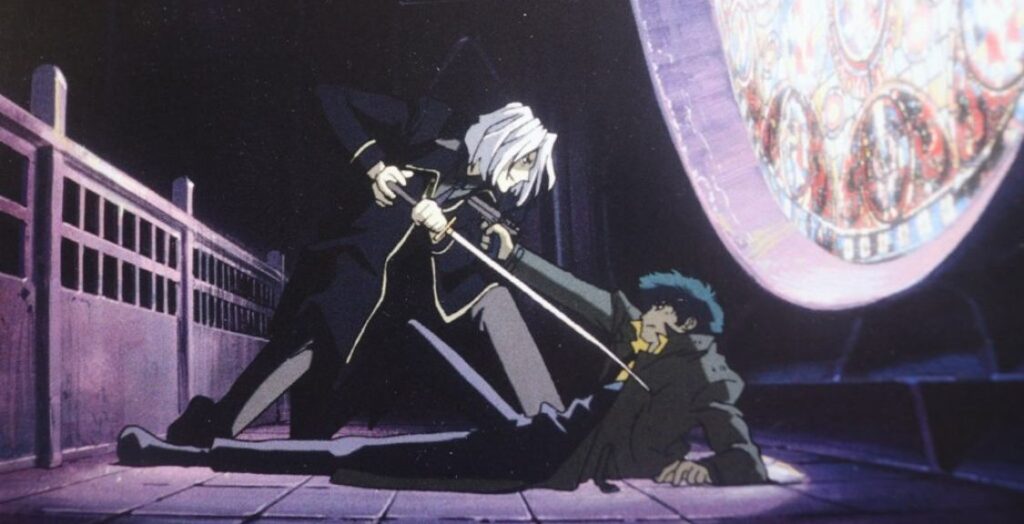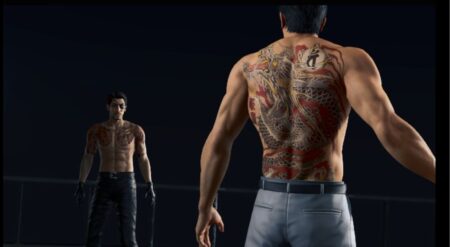Jazz, violence, and space. Cowboy Bebop and the sacred space it held on Cartoon Network’s Adult Swim anime line-up was formative for a lot of anime fans. For myself, it was the first seinen anime I watched and one that expanded what I thought anime could be. From its soundtrack to its characters, the adventures of the Bebop crew are a piece of anime history that sticks with me in my everyday life. While that includes “TANK!” having a dedicated spot on my music playlists, Cowboy Bebop has taken another special honor in my life: explaining my trauma.
What no one tells you when you experience trauma is that “you’re gonna carry that weight.” Whether you’re processing it, ignoring it, or it’s freshly formed, it carves a hole into your mind and body like a knot in a tree. Since 2020, I have cut off an emotionally abusive friend, locked down during a pandemic, survived my home dipping into freezing temperatures without power for over 90-hours, lost 10 members of my family, and was laid off from a company I dedicated my life to.
And that’s just in the last three years, let alone my past, which includes surviving when it felt like I couldn’t. That said, even when I start to feel at ease, the weight comes crashing down at unforeseen moments.
If you’re not familiar with Cowboy Bebop, each episode ends with a title card of small white text in the bottom right-hand corner with a saying, some taken from songs, others linking to the story. In the last episode of the series, the screen fades to black, showcasing:
“You’re gonna carry that weight.”
A reference to a Beatles song of the same name, it contextualizes the entirety of the anime series in its closing. No matter how hard you try to outrun your trauma or your past, you’ll have to confront it, and you’ll have to carry that weight. When we meet each member of the team, Bebop, Spike, Jet, Faye, and Ed, each one is carrying their own weight, and over the course of the series, they see the way that emotion and moment affect their path forward. For Spike, it’s the final episode that finally shows him dealing with his.
While Cowboy Bebop isn’t just about confronting their past pain and trauma, each character has episodes that pit them against their past in a way that puts the weight they carry on display. For the most part, the series follows the space outlaw handbook (inspiring series like Serenity). The bounty of the week’s episodic nature allows the audience to escape some of the larger themes until small moments turn into big moments, and the audience has to realize their favorite character is in pain.
Cowboy Bebop is all about handling our trauma, or, not.

But for many, that’s how trauma works. It isn’t present all the time. It washes on your shore slowly at first—a word, a look, a feeling—and then cascades over you, invoking fear. It’s a weight you carry that slowly increases as you interact with your environment. For me, it’s the moment I have to edit someone’s work because of my friend-turned abusive co-worker.
It’s when I have to leave my home because I remember what it’s like to be berated by a cop with his hand on his holster. And because of Texas’ winter storms, it’s the nightmares of natural disasters and an immediate panic when the temperature starts to drop. It’s my stomach dropping when a surprise 1:1 meeting it put on my calendar. They add weight little by little to your daily tasks, and as you mitigate it, you find some relief, but ultimately, you’re just trying to figure out how to survive.
While there are episodes that show Jet, Faye, and Ed confronting their past and, for the most part, overcoming it, Spike’s trauma in Cowboy Bebop is like a rabbit he can’t help but chase. With the series’ iconic last moment leaving Spike’s fate in a liminal space, possibly dead or possibly alive, the consensus with most fans is that our space cowboy didn’t escape his pain.
No, despite being confronted with a new reality, he can’t adjust. He’s consumed by pain and revenge and can’t see past it. Ultimately, he has to die in that moment. He can’t live without his grief and he can’t function without something to run to. The rest of the Bebop crew ran away from their past, growing as people once they turn around and confront it. In stark contrast, though, Spike can’t stop running towards it. He can’t let things go because then he wouldn’t know who he is if he did.
Trauma isn’t simple. Sometimes, you get used to it, and you live with it like an old friend. Other times, you can serve it an eviction notice, and other times, you can’t seem to turn away. But regardless, you’re gonna carry that weight. In Cowboy Bebop, Spike carries his weight, and he crumbles under it.
Sure Cowboy Bebop is iconic because of the animation, because of the blending of science fiction and Western, and because of the beautiful collaboration between story and music. For me though, it was a lesson on how you carry the weight. And now, as I sit here 23 years after the series’ release and on my double-digit rewatch, it’s a mirror that I can see myself in. I don’t know if I’m gonna buckle under the weight of everything I’ve been through this year, last year, and every year before. But I do know that I’m gonna start turning away, or at least, get to a point where the confrontation doesn’t leave me sacrificing who I am.
Cowboy Bebop is now streaming on Netflix in both the original anime and live-action format.







